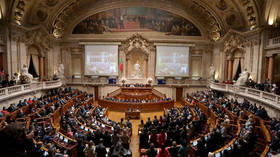EU nation refuses to compensate for slavery

Portugal will not pay reparations for atrocities committed during the transatlantic slave trade and the colonial era, the government said on Saturday.
The statement was in response to remarks made earlier in the week by Portuguese President Marcelo Rebelo de Sousa, who said his nation should “assume full responsibility” for the colonial-era and find a way to pay compensation.
Local media reported the statement as indicating there were no plans for a “process or program of specific actions” to provide restitution.
Portugal’s colonial era lasted more than five centuries. The decolonization of some African countries only occurred in 1974 after the ‘Carnation Revolution’ led to the fall of the authoritarian Estado Novo regime.
The territory of the Portuguese Empire in Africa included present-day Angola, Mozambique, Guinea-Bissau and the island nations of Cape Verde, and Sao Tome and Principe.
The country is widely thought to have been the first European state to play a major role in the African slave trade. Between the 15th and the 19th centuries, almost six million Africans were forcibly transported across the Atlantic by Portuguese vessels and sold into servitude. Most went to Brazil, which was a Portuguese colony until 1822.
In September, UN Secretary-General Antonio Guterres, who is also a former Portuguese prime minister, urged former colonial states to consider financial reparations among measures to compensate for the enslavement of Africans. In a report, he said that up to 30 million people were violently uprooted from Africa over a span of more than 400 years.
“Under international human rights law, compensation for any economically assessable damage, as appropriate and proportional to the gravity of the violation and the circumstances of each case, may also constitute a form of reparations,” Guterres said.












